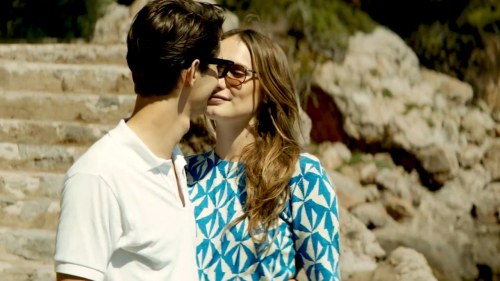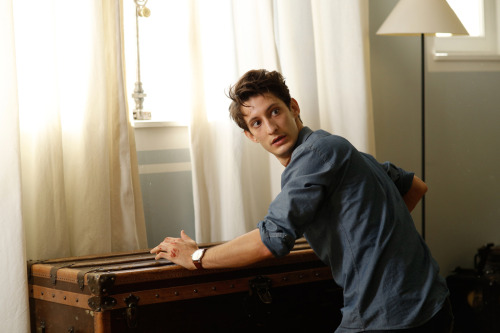Classy Film: Un Homme Idéal (A Perfect Man)This is a story you have seen and read many times
Classy Film: Un Homme Idéal (A Perfect Man)This is a story you have seen and read many times before: unable to achieve success through talent alone, a man (and it’s always a man) resorts to deception to attain his goal. Currently showing in France and soon to open the Colcoa French Film Festival in Los Angeles, Un Homme Idéal or A Perfect Man focuses on Mathieu Vasseur (Pierre Niney), a wannabe writer making ends meet as a mover while attempting to publish his first novel. While on the job, he finds Sable Noir, the diary of a dead soldier who fought in the Algerian War and decides to publish it under his name. Beloved by critics and the public, Sable Noir enables Mathieu to meet Alice Fursac (Ana Girardot) and to live as the successful author he’s always wanted to be. A couple of years pass. The rhythm of the publishing industry, not to mention a significant advance from his publisher, demand a second novel - a book Mathieu has neither the talent, nor the imagination, to write. So far, so formulaic. But is the film actually good? In interview after interview, Niney praised the scenario, but I found it telegraphed and scholarly. Director Yann Gozlan has a wide and far-reaching cinematographic knowledge, and wants you to know it. An early scene, featuring Alice’s father showing off his gun collection to Mathieu, has literal Chekhovian accents. The scorched photography nods to Minghella, Hitchcock, Deray and Chabrol. The fact that a film loosely based around plagiarism could owe so much to such distinguished predecessors… well that’s one of the most interesting things about it. But Un Homme Idéal fails to equal the thrillers shot by these directors and, at times, borders on parody - especially in its third part. The way Mathieu disposes of the body of Alice’s former boyfriend (who he killed with one of the guns) is straight out of the manual of how-not-to-dispose-of-a-corpse. He drags him through the lawn, wraps him up in material from his in-laws and later on, scared by coastguards when dumping it in the sea, leaves the boat stranded in the middle of the ocean. All these details could be symptomatic of Mathieu’s panic, yet in the cinema they were eye-rolling rather than tense. The film never recovers, despite Niney’s first-class acting, which has been unanimously heralded by critics and which was the single reason why I went to see the movie. Girardot, whose acting I wasn’t familiar with, is also good as Alice, despite her character being underdeveloped. Mathieu falls for her as she is lecturing on the role of smell in literature. Their second meeting is at a literary party to celebrate Sable Noir. Early on, Alice is set up as a literary expert, with a network in the milieu, which is part of the reason why Mathieu is so attracted to her and so scared of disappointing her. Yet as the story unfolds, she becomes yet another pretty girl lounging by a pool, little more than one of Mathieu’s motivations not to be found out. Driving back from the cinema, my sister and I couldn’t remember a single movie where a woman had stolen someone else’s identity and talent for recognition or social climbing purposes. As much as I liked Niney, Yann Gozlan would have had a stronger, more original feature had both lead actors’ genders been reversed. -- source link
Tumblr Blog : fashionabecedaire.tumblr.com
#classy film








